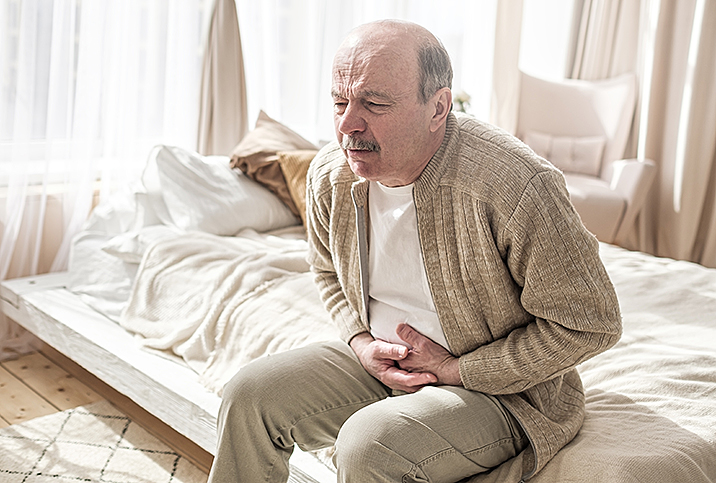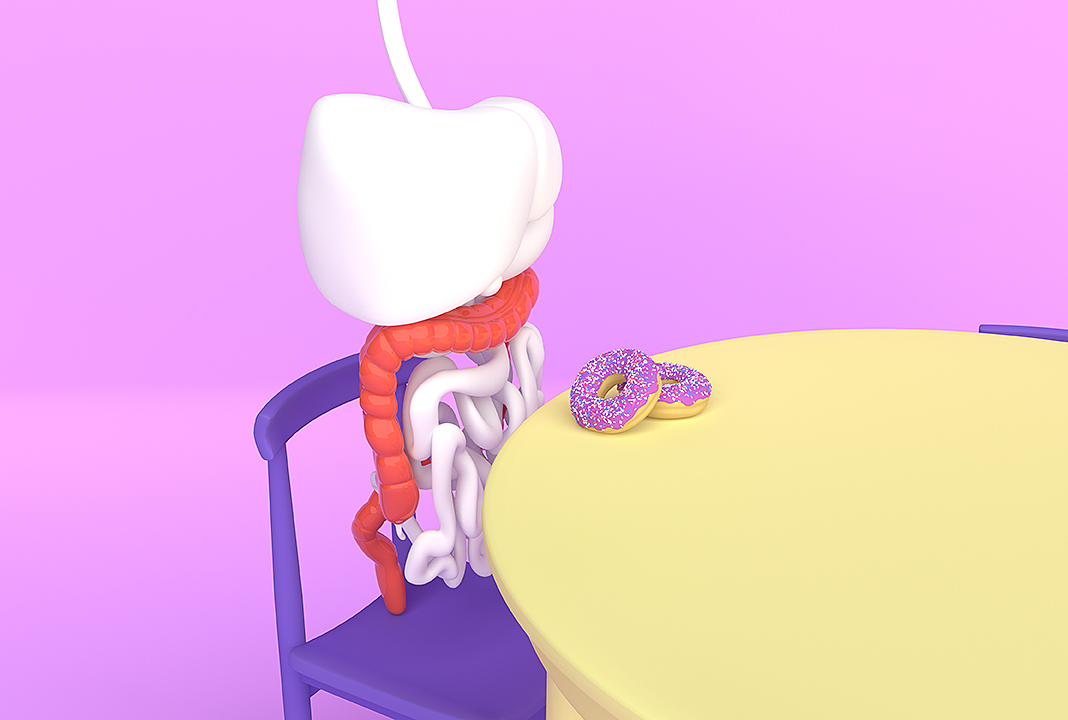Not Your Typical Tummy Ache: The Diverse Symptoms of IBD

The exact cause of inflammatory bowel disease (IBD) remains a mystery, but over the years, researchers and medical professionals have learned a lot about managing and treating this lifelong gastrointestinal condition.
IBD can lead to problems involving your sexual health. It's true that there's no specific reason IBD patients cannot be intimate. However, the course of the disease, medication and possible surgical solutions necessary for some people—as well as the regular symptoms—can certainly kill a romantic mood.
Certain symptoms of inflammatory bowel disease and the medications and surgeries to treat the condition can also lessen libido and potentially cause erectile dysfunction (ED) in men.
It's estimated by the Crohn's & Colitis Foundation that around 40 percent of people with IBD report the disease prevents them from forming intimate relationships. Almost 70 percent of IBD patients also claim that it has caused them to have body image problems. Sexual dysfunction is reported by 52 percent of women and 20 percent of men with IBD.
Not just one condition
It is important to understand inflammatory bowel disease shows up in two primary forms, Crohn's disease and ulcerative colitis.
Both of these conditions are distinct and separate but do have similar symptoms, such as:
- Arthralgia. Joint pain that could also feel like stiffness or swelling.
- Bloating. Gas accumulates in the gastrointestinal (GI) tract, causing discomfort.
- Diarrhea. This can happen frequently and could alternate with bouts of constipation and potentially lead to dehydration. Bowel urgency or the immediate need to defecate also may be experienced.
- Fever. This could result in night sweats.
- General fatigue. Frequent feelings of lethargy, sleepiness or tiredness.
- Indigestion. Also known as upset stomach. May feel like a burning sensation.
- Itchy eyes. An uncommon symptom, but this can include redness of the eye and general discomfort.
- Loss of appetite. Typically associated with weight loss.
- Nausea. This may lead to vomiting.
- Pain. Mostly in the abdominal area; severity depends on the extent of the inflammation and varies between individuals.
- Rectal bleeding. This may occur with or without the passage of stool.
- Skin rashes. Typically associated with a lack of zinc due to excessive diarrhea. Generally in the form of psoriasis or hives.
- Sudden weight loss. Typically unprompted and unplanned.
- Tainted stool. You may observe blood or mucus in your poop.
Crohn's disease typically causes inflammation in the small intestine, near the area connected to the large intestine. However, the inflammation may appear in any area along the hollow organs of the GI tract.
Ulcerative colitis appears only in the large intestine.
The nature of the inflammation also differs between the two conditions. With Crohn's, it appears in scattered patches, while in ulcerative colitis, it is uniformly distributed along the damaged area of the rectum or colon. Additionally, Crohn's tends to cause fistulas, which are tunnel-like bridges between organs, or between one organ and the surface of the skin.
IBD tests
If you're experiencing any of these symptoms and suspect you may have IBD, it's important to see a specialist to get professionally evaluated.
"Once symptoms appear, it's important to see a gastroenterologist right away for disease detection. The common screening process involves locating where the inflammation is in the GI tract to determine which type of IBD is present," said Beata Rydyger, R.H.N., a nutritionist based in Los Angeles and a clinical advisor to Zen Nutrients.
According to Inna Lukyanovsky, Pharm.D., a functional medicine practitioner and gut health and hormones expert in New Jersey and the bestselling author of "Crohn's and Colitis Fix" and "Digestive Reset," there are tests that potentially help screen for, diagnose and monitor inflammatory bowel disease.
In addition to getting a health history and doing bloodwork, doctors may use the following tests:
- Colonoscopy, upper endoscopy, sigmoidoscopy and capsule endoscopy.
- C-reactive protein (CRP) and erythrocyte sedimentation rate (ESR) levels are usually taken to monitor nonspecific inflammation.
- Iron and hemoglobin levels are monitored for people with potential anemia because of IBD.
- Liver function enzymes are important to monitor when there's drug therapy, to avoid liver-related complications.
- Stool calprotectin levels are monitored for IBD and less than 200 micrograms per milligram usually indicates remission.
Keep in mind that the condition is usually diagnosed using a combination of tests.
"There is no single test that can diagnose IBD, and the diagnosis should only be performed by the gastroenterologist," according to Jelena Vulevic, a gut microbiologist in the United Kingdom with 20 years of experience.
"Family history is taken into the consideration because of the close genetic link, followed by blood and stool samples that amongst other things measure markers of GI inflammation, for example, C-reactive protein and calprotectin," she added. "Confirmation is almost always obtained by imaging studies, although sometimes endoscopy and biopsy are required, too. Monitoring and the progression of the disease are done in exactly the same way."
Myths and misconceptions
Inflammatory bowel disease affects all ages and genders, and millions of Americans have some form of this condition. However, IBD is on the rise among older adults. In fact, the prevalence of the disease increased among Medicare beneficiaries of all racial and ethnic groups from 2001 to 2018, according to the Centers for Disease Control and Prevention (CDC).
Unfortunately, these three myths about IBD perpetuate:
Appropriate nutrition does not matter
"There are a lot of myths associated with IBD, and the most common one that was very common before was that diet did not matter in the case of improving symptoms," Lukyanovsky noted. "We know now that appropriate nutrition really matters."
IBD leads to colon cancer
"There are still misconceptions about the risk of colon cancer," she added. "Many clients I worked with believe that colon cancer is the next development in their disease. It doesn't have to be. There are also lots of holistic options for IBD, including helminthic therapy."
IBD is the same as IBS
"IBD and IBS are often confused with one another. However, the disorders are vastly different," Rydyger explained. "Though similar symptoms may be experienced, the disease process, the damage it can wreak on the body and long-term outcomes may vary. If IBD is left untreated, it can have serious, life-threatening implications."
What happens if IBD goes undiagnosed?
People with inflammatory bowel disease can live normal, active lives. However, the duration of the disease matters, and the longer you've been living with IBD, the higher your odds of developing various other complications.
Aside from fistula formation, these complications may include but are not limited to:
- Anemia
- Arthritis
- Cirrhosis
- Kidney stones
- Malnutrition
- Osteoporosis
- Perforated bowel
- Severe fatigue
- Toxic megacolon
- Very low immune system response
- Very poor quality of life
Patients living with IBD need to be under regular medical surveillance to mitigate their risk of developing colorectal cancer. This is especially important for those living with ulcerative colitis. Patients with ulcerative colitis are about 2.4 times more likely to develop colorectal cancers compared to the general population, and the risk continues to increase as the patient ages, according to research published in 2018. This is certainly alarming, but taken as a whole, less than 2 percent of ulcerative colitis patients go on to develop cancer, according to ongoing research studies.
Fistulas and colorectal cancers are not the only life-disrupting risks. One of the most worrying aspects of inflammatory bowel disease shared by patients of both ulcerative colitis and Crohn's disease is the potential need for ostomy surgery. This procedure involves creating an opening in the abdomen, meant to divert the passage of waste through a newly made stoma, which is sometimes called a "front bum." The waste is collected in an ostomy pouch (that attaches to the stoma) and needs to be drained or replaced four to five times every day.
Ostomy surgery may grant patients with severe cases of IBD a much-needed, long-term respite from pain. According to a study published in 2016 in the Inflammatory Bowel Diseases journal, ostomy surgery is well tolerated in Crohn's disease patients and does not significantly impact a patient's health-related quality of life.
An ostomy can be either temporary or permanent. In general, inflammatory bowel disease ostomies are temporary and meant to allow the gastrointestinal tract time to heal after certain IBD-related surgeries, which include:
- Bowel resection (removal of the specific damaged section of the small intestine)
- Colectomy (removal of the colon)
- Proctocolectomy (removal of the colon and rectum)
These procedures all permanently alter the path of the GI tract by removing the damaged and inflamed areas.
Finding a definitive diagnosis
If you suspect you have inflammatory bowel disease, it is best to consult a gastroenterologist to determine if the condition is present and where it is located in the GI tract. A treatment plan can then be drafted and the appropriate medications can be prescribed to help keep the flare-ups under control. Your doctor may also recommend lifestyle and dietary changes to help the disease stay in a state of remission and help you manage its symptoms.
"IBD is a serious condition and it's very important that it is diagnosed and managed properly," Vulevic explained. "Higher frequency of symptoms and GI inflammation that go with it lead to further disease progression and irreversible damage to the intestinal tissue, GI microbiota and the immune system. Eventually, surgical removal may be required, and IBD predisposes to colorectal carcinogenesis and several other issues. Thus, it's very important that it doesn't go undiagnosed."
Rydyger added that inflammatory bowel disease can be life-threatening if it's left undiagnosed and not treated soon enough. This is why it is important to work with both a doctor and certified nutritionist for diagnosis, treatment and management of symptoms through an appropriate dietary and lifestyle protocol.


















